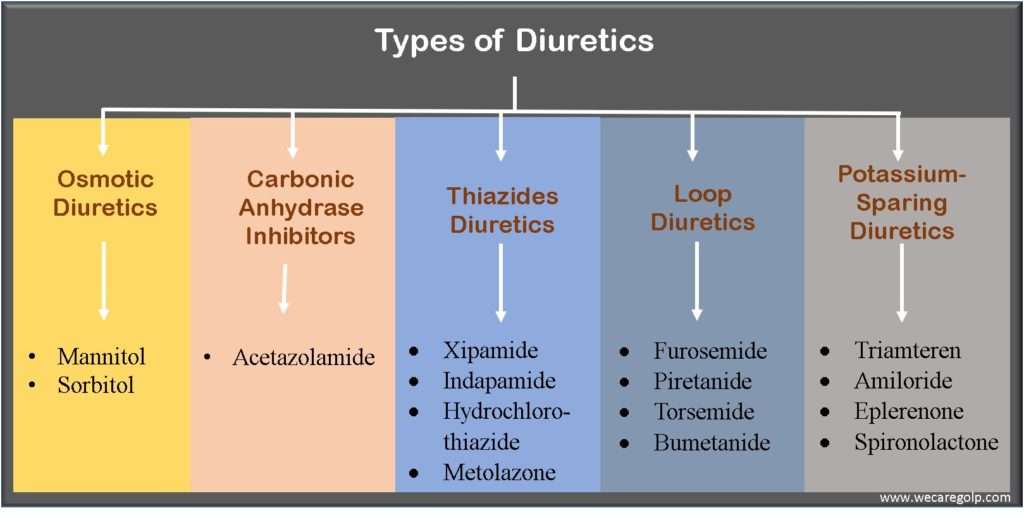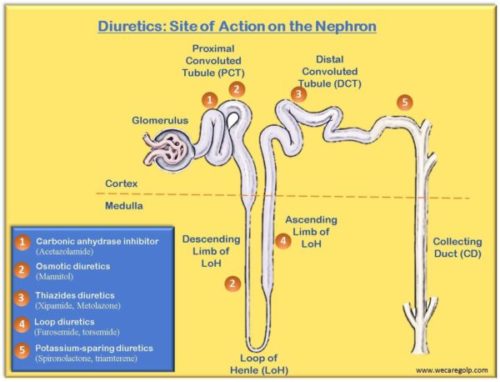Introduction
Diuretics are drugs that increase urine output by the kidneys.
- Diuretics, also called water pills, reduce the high blood pressure. Therefore, it is also used as antihypertensive durgs.
- It mainly works by increasing sodium excretion (sodium remains in the tubular lumen). The water follows the sodium passively.
- The kidneys form urine by filtering water and harmful metabolic products (urinary substances) from the blood.
- The fine structures of the kidney collect urine and direct it to the outside via the ureters, bladder, and urethra.
- Generally, these drugs are safe. It may cause electrolyte imbalances leading to life-threatening problems.
Indications
Diuretics use when the volume of liquid in the body should reduce by increasing urine output:
- Edema (washing out of fluid stored in the tissue)
- High blood pressure (reduction in circulating blood volume and thus lowering of blood pressure)
- Heart failure (reduction in the volume of blood that needs to pump through the weakened heart muscle)
- Poisoning (increased excretion of toxic substances)
- Glaucoma (will reduce the pressure in the eye).
Types of diuretics
- Osmotic diuretics
- Carbonic anhydrase inhibitors
- Thiazide diuretics
- Loop diuretics
- Potassium-sparing diuretics

Osmotic Diuretics
- Osmotic diuretics are substances with low molecular weight and filter through the glomerulus easily.
- It produces diuresis by increasing the osmotic pressure within the kidney.
- Since the osmolarity is high in the tubules, the water does not reabsorb in the tubular system, and urine excretion increases.
Pharmaceuticals
- Mannitol, e.g., Osmofundin®
- Sorbitol, e.g., sorbitol solution for infusion
Indications
- Cerebral edema
- Poisoning
- Prophylaxis of acute renal failure
Contraindications
- Lung’s edema
- Heart insufficiency
- Anuria
Side effects
- Severe water loss (dehydration)
- Circulatory load in the initial period by infusing an additional amount of liquid
Carbonic Anhydrase Inhibitors
- Inhibition of the enzyme carbonic anhydrase reduces the activity of carbonic anhydrase and inhibits the reabsorption of bicarbonates from the renal tubules.
- It causes the retention of sodium in the renal tubules.
- Thus, diuresis increases along with increased excretion of sodium and water.
Pharmaceuticals
- Acetazolamide, e.g., Diamox®
Indications
- Elevated intraocular pressure
- Edema
- Altitude sickness
Contraindications
- Hepatic coma
- Kidney damage Existing hypokalemia
Side effects
- Hypokalemia
- Hyponatremia
- Metabolic acidosis
- Cardiac arrhythmia
Thiazides Diuretics
- It inhibits sodium reabsorption in the distal tubule (15%). The result is sodium remaining in the tubule and increased sodium and water excretion.
- At a glomerular filtration rate <50 ml/min, thiazides alone are not effective.
- In healthy kidneys, the increased supply of sodium can lead to hypokalemia via an exchange of Na with K. In people with healthy kidneys, it is used to treat hypertension and heart failure, usually in combination with a potassium-sparing diuretic.
- In patients with impaired renal function, thiazide in combination with loop are essential to increase their effectiveness.
- Loop diuretics lead to an increased supply of urine in the distal tubule, approx. 60% of the sodium (& water) is reabsorbed here.
- Thiazide reduces the absorption rate, and thus the diuretic effect of the loop diuretics is increased.
Pharmaceuticals
- Xipamide (e.g., Aquaphor)
- Indapamide (e.g., Natrilix)
- Hydrochlorothiazide (e.g., HCT Beta)
- Metolazone (Zaroxolyn)
Indications
- Hypertension
- Oedema in chronic renal and cardiac insufficiency
Contraindications
- Pregnancy
- Hepatic coma
- Kidney damage
- Hypokalemia
Side effects
- Hypokalemia
- Exsiccosis
- Reduction in GFR in Monotherapy
- Worsening of a diabetic metabolic status
- Hyperuricemia, acute attack of gout
- Cross-allergy with sulfonamides
- Hypercalcemia
Loop Diuretics
- It acts on the ascending part of Henle’s loop and prevent the reabsorption of sodium, potassium, and chloride.
- They characterize by a strong effect and rapid onset of action.
- You can maintain residual diuresis even if you have severely impaired kidney function (glomerular filtration rate <5 ml/min).
Pharmaceuticals
- Furosemide (Lasix, Fusid)
- Piretanide (Arelix, Eurelix, Tauliz)
- Torsemide (Torem, Unat)
- Bumetanide (Bumex)
Indications:
- Edema in acute renal and cardiac insufficiency, acute pulmonary edema
- Impending anuria (cessation of urine production)
- Forced diuresis in case of poisoning
Contraindications
- Hepatic coma
- Kidney damage with anuria
- Existing hypokalemia
- Pregnancy (long-term treatment)
Side effects
- Hypovolemia, in case of overdose prerenal renal failure
- Hypokalemia
- Hyperuricemia (uric acid level increases)
- Hearing damage (at high doses)
- Hypocalcemia and hypomagnesemia
Potassium-sparing Diuretics
- The potassium-sparing diuretics inhibit sodium reabsorption in the distal tubule (from the blood side).
- At the same time, there is considerable potassium retention.
- This group also includes aldosterone antagonists (e.g., spironolactone). They block aldosterone, which promotes sodium reabsorption and potassium excretion. After that, they increase sodium and urinary excretion.
Pharmaceuticals
- Triamterene (Dyrenium)
- Amiloride (Midamor)
- Eplerenone (Inspra)
- Spironolactone (Aldactone, Osyrol, Carospir)
Indications
- Long-term therapy of hypertension (in combination with other diuretics)
- Primary and secondary hyperaldosteronism (spironolactone)
- Proteinuria
Contraindications
- Renal insufficiency
- Existing Hyperkalemia
- Existing Hyponatremia
- Pregnancy
Side effects
- Hyperkalemia
- Gynecomastia and amenorrhea (spironolactone)
- Disorders in the gastrointestinal tract
References
- https://www.ncbi.nlm.nih.gov/books/NBK557736/
- https://www.mayoclinic.org/diseases-conditions/high-blood-pressure/in-depth/diuretics/art-20048129
- https://www.webmd.com/hypertension-high-blood-pressure/guide/diuretic-treatment-high-blood-pressure
- https://www.healthline.com/health/diuretics#risks
- https://www.rxlist.com/diuretics/drugs-condition.htm


1 thought on “Diuretics”